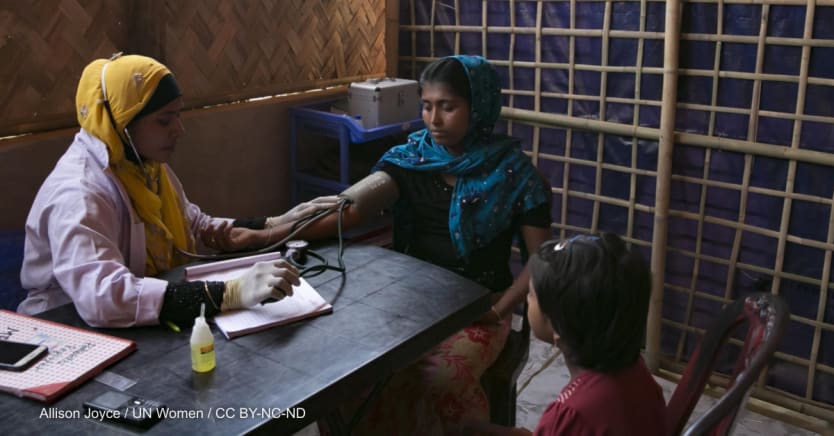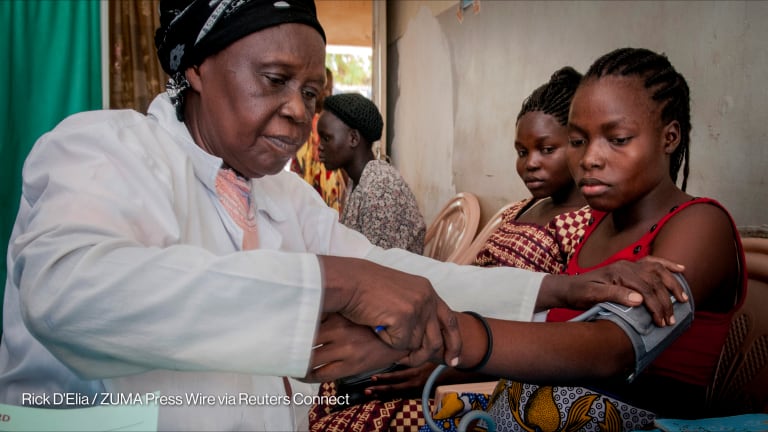Opinion: How to close the contraception gap for women in crisis settings

We know the facts. Contraception saves lives. Access to contraception also allows women and adolescent girls agency over their reproductive decisions. And we know that even in the most challenging of circumstances — such as during crises and conflicts — the right to reproductive self-determination is as true for refugees and other displaced people as it is for women everywhere.
For women and girls affected by crises like conflict and natural disasters, the need for contraceptive access is particularly acute. They face an increased risk of unintended pregnancy, maternal death and disability, and sexual violence.
This isn’t new information, though. Since the 2017 London Summit on Family Planning — and even before then — there has been no shortage of evidence and advocacy demonstrating both need and demand for sexual and reproductive health, or SRH, services in humanitarian settings.
From Ethiopia to Syria to Cox’s Bazar, displaced women and girls have demanded SRH services, including contraception. And, of course, governments have committed to advancing the SRH of women and girls around the world.
However, a recent two-year assessment of contraception in crisis-affected settings by the Women's Refugee Commission found that contraceptive services remain a gap in humanitarian response — both in funding and prioritization.
Among the 20 organizations that responded to a survey of global contraceptive programming in humanitarian settings, one-fourth of their humanitarian health programs did not include contraceptive services. That is alarming.
Even where services are available, provision of the full contraceptive method mix, particularly long-acting reversible contraception [LARCs], and emergency contraception [EC] continues to be problematic. LARCs provide highly effective, long-lasting protection from unintended pregnancy, while EC is the only method that can be used after unprotected sex to prevent unintended pregnancy.
SRH services, including contraception, were particularly impacted because decision-makers did not perceive them to be essential or lifesaving. This is both shortsighted and runs counter to what we know.
—Yet, LARCs, EC, and even oral contraceptives all were reported to be out of stock to varying degrees across humanitarian settings. That is dangerous.
Adolescents were also found to be falling into the contraception gap. Evidence consistently shows that adolescents want, need access to, and will use SRH services, including contraception.
However, an alarming 41% of programs reported that contraceptives were never, or only sometimes, available to unmarried adolescents. Stigma and negative attitudes from health providers and community members, including parents and spouses, present ongoing barriers, particularly for unmarried girls.
Follow-up interviews specific to COVID-19 showed that the pandemic only exacerbated existing challenges. Contraceptive service delivery was disrupted by lockdowns, facility closures, and movement restrictions.
According to a series of interviews with experts in the field, SRH services, including contraception, were particularly impacted because decision-makers did not perceive them to be essential or lifesaving. This is both shortsighted and runs counter to what we know about advancing the health and well-being of women and girls.
So, what’s the holdup? Simply put, awareness and investment. Still. Despite years of robust global advocacy around family planning in humanitarian settings, government commitments, and evidence that dedicated funding and commitment do enable contraceptive service provision — the contraception gap in humanitarian settings remains.
While U.S. President Joe Biden’s proposed budget for fiscal year 2022 takes important steps in the right direction by restoring some funding to the U.N. Population Fund and returning to evidence-based rationales for including family planning and reproductive health in global health investments, it does not go far enough to repair the devastating impact on services by the Trump administration.
President Biden needs to release $32 million that Congress appropriated for FY 2021 for UNFPA. His budget also falls short of the $1.7 billion that SRH and rights advocates note is the necessary U.S. fair share to address the current unmet contraceptive needs of 218 million women in low- and middle-income countries.
SRH rights advocates now look to Congress to ensure the final budget responds to the family planning needs — and demands — of women and girls, including those affected by conflict or crisis. This is on top of devastating news out of the United Kingdom — a longstanding global leader in SRH funding. The U.K.’s Foreign, Commonwealth & Development Office recently announced it will slash UNFPA supplies funding by 85% and its core funding by 60%.
It is now critical that humanitarian organizations double down on holding all donor governments accountable for their global commitments to women’s reproductive health and rights by tracking and advocating for funding and prioritization of SRH.
It is equally essential that humanitarian organizations hold themselves accountable for prioritizing access to contraceptive services. We must also provide direct, flexible, and long-term funding to support and strengthen local partners to lead contraceptive service delivery — from preparedness, response, to recovery — to enable a more sustainable path forward.
The U.N. estimates that 235 million people will need humanitarian assistance this year alone, a nearly 40% increase from 2020. Without access to contraceptive services, many more women and girls will be forced to contend with unplanned pregnancies in addition to the traumas of conflict, disaster, and displacement. Some will die. It is no longer acceptable for donors, governments, and humanitarian organizations to just mind the gap. We must close it.
Search for articles
Most Read
- 1
- 2
- 3
- 4
- 5








